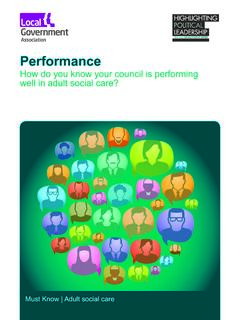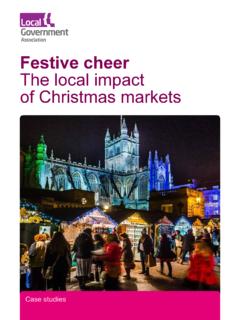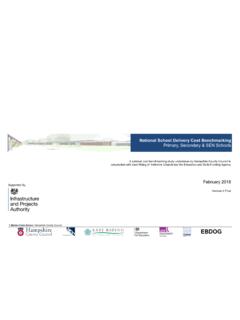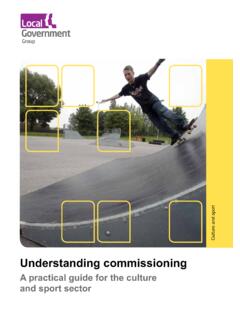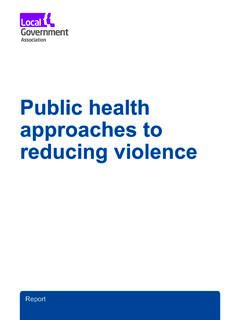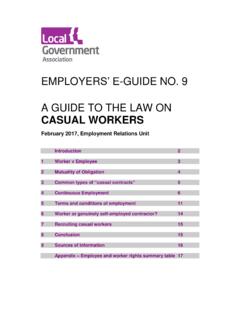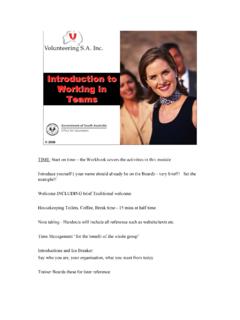Transcription of Gambling regulation: Councillor handbook (England …
1 Gambling regulationCouncillor handbook (England and Wales) Updated guidance 2018 Foreword 3 The regulatory framework for Gambling : an overview 4 Role of councillors 8 Licensing authority statement of principles 12 Key issues for the statement of principles 14 Licensing fees 21 Protecting vulnerable people 23 Gambling related harm and problem gamblers 26 Illegal Gambling 29 Sector specific issues 32 Checklist 35 Glossary 36 Annex 1: Gaming machine allowances, stakes and prizes 38 Annex 2.
2 Sample of premises licence conditions 40 Contents3 Gambling regulation Councillor handbookForewordThe 2005 Gambling Act was a pivotal point in Gambling regulation in the UK. By liberalising previous Gambling legislation, it established Gambling as a mainstream leisure and social activity. Recent data shows that in the year to December 2017, 45 per cent of people had participated in some form of Gambling , almost evenly split between men, 48 per cent, and women 41 per cent. But even since the Gambling Act was introduced, the Gambling landscape has changed significantly. Technological developments mean that significant numbers of people gamble remotely; 18 per cent of those who gambled in 2017 gambled online.
3 This has gone hand in hand with a significant increase in the volume of Gambling advertising, particularly linked to have also seen significant changes in the physical presence of Gambling in our local areas. While much of the concern that accompanied the introduction of the Act centred on the prospect of large scale casinos, in practice it has been patterns of betting shop clustering and the use of fixed odds betting terminals inside those betting premises, that have generated significant political and public concern. As this handbook was being updated, the Government s consultation in its review of gaming machines and social responsibility measures closed. Having lobbied for several years for a substantial reduction in fixed odds betting terminal (FOBT) stakes, we are hopeful that the review will deliver this and remove high stakes Gambling from our high developed in 2015 to provide an overview of the responsibilities binding on licensing authorities and Gambling operators in their areas, this handbook has been updated to coincide with the revision by licensing authorities of their statement of licensing principles by January 2019.
4 The changes introduced two years ago to both statements of principles and the licensing conditions and codes of practice which sought to tailor local approaches to licensing and strengthen operator social responsibility measures have begun to embed, and there is a now a range of good practice for councils to build on. Licensing statements, backed up by local area profiles, provide an opportunity for authorities to set out how Gambling will be regulated in their areas, and their expectations of operators. They can be used to identify areas where the risk of harm from Gambling may be greater due to the particular characteristics of an area, and how these risks can be mitigated.
5 The Local Government Association (LGA) encourages all of its members to ensure they develop statements of principles, area profiles specific to their locality, and to make use of the range of tools that are hope you find the handbook useful. Councillor Simon Blackburn Chair, LGA Safer and Stronger Communities Board4 Gambling regulation Councillor handbook The Gambling Act 2005 (the Act) consolidated and updated previous Gambling legislation, creating a framework for three different types of Gambling : gaming, betting and lotteries. Gambling can take the form of non-remote Gambling , which takes place in a Gambling premises, and remote Gambling , which is typically undertaken by phone or online.
6 Councils do not have any regulatory responsibilities in relation to remote Department for Digital, Culture, Media and Sport (DCMS) is the lead government department for Gambling Gambling CommissionThe Gambling Commission is responsible for regulating Gambling in accordance with the Act, and for issuing operating licences to Gambling businesses and personal licences to individuals. In regulating Gambling , the Commission is required to have regard to the three licensing objectives for Gambling , which are: preventing Gambling from being a source of crime or disorder, being associated with crime or disorder or being to support crime ensuring that Gambling is conducted in a fair and open way protecting children and other vulnerable persons from being harmed or exploited by regulatory framework an overviewGambling Act to be appliedby licensing authoritiesLicensing objectivesGuidance to licensing authoritiesStatementof principlesLicensing conditions and codes of practicePrinciples to be applied by licensing authorities5 Gambling regulation Councillor handbookThe Commission is required to aim to permit Gambling .
7 Providing that it is consistent with the licensing help fulfil its role, the Commission attach licence conditions and issue codes of practice relating to how Gambling facilities should be provided, and guidance to licensing authorities (district councils and unitary authorities) on how to implement their responsibilities under the Act. Licensing authorities and types of gamblingLicensing authorities1 are a key partner in Gambling regulation, with a responsibility for overseeing non-remote Gambling in their local areas. This involves: setting the local framework for Gambling through their statement of principles considering applications and issuing licences for premises where Gambling takes place, with conditions where appropriate reviewing or revoking premises licences issuing permits for some forms of Gambling undertaking inspection and enforcement activities, including tackling illegal betting shops are the most commonly recognised Gambling premises, councils are responsible for overseeing Gambling in many different types of business.
8 Betting shops bingo halls adult gaming centres family entertainment centres (FECs) casinos race-courses and other tracks (defined as sporting venues, eg football or rugby stadiums) alcohol licensed premises and clubs that have gaming ( fruit ) machinesmembers clubs with gaming District and unitary councilsWhile most Gambling establishments require a premises licence before they are able to operate, licensing authorities issue permits to unlicensed family entertainment centres (uFECs) (typically found in seaside resorts, motorway service stations or airports) and to alcohol licensed premises and clubs. Licences or permits enable businesses to provide specified maximum numbers and types of gaming machine.
9 There are different types of gaming machines, with varying stakes (the amount allowed to be gambled at one time) and prizes (the amount the machines are allowed to pay out), and some types of machine are only allowed in specific premises. This is outlined in the table in Annex 1. Maximum stakes and prizes are set by the DCMS, and are currently subject to a triennial review. At the time of publication, with the Government s consultation on stakes closing only in January 2018, the majority of stakes and prizes look set to remain unchanged, with the exception of an expected significant reduction in the maximum B2 stake ( FOBTs , commonly found in betting shops) and an increase in prize gaming stakes and prizes.
10 Like the Gambling Commission, licensing authorities are bound by a statutory aim to permit and must grant premises licences so long as applications are in accordance with: the Gambling Commission s codes of practice the guidance to local authorities the licensing authority s own statement of principles the three licensing the Act was introduced, a number of licensing authorities have been frustrated at their limited grounds to refuse premises applications. Authorities that have tried to reject applications on the basis that there are already clusters of betting shops on their high streets have generally seen their decisions overturned on appeal. This is partly because the licensing objectives under the Act are different to those under the Licensing Act 2003, in that they do not include public 6 Gambling regulation Councillor handbook safety or the prevention of public nuisance, creating a very high bar for refusing premises applications on the basis of licensing objectives.
